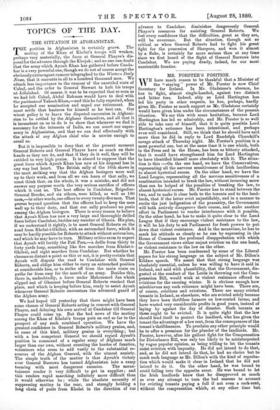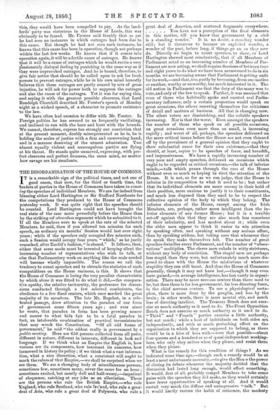MR. FORSTER'S POSITION.
WE have much reason to be thankful that a Minister of the " staying " power of Mr. Forster is now Chief Secretary for Ireland. In Mr. Gladstone's absence, he- has to fight, almost single-handed, against two distinct and bitter foes. Indeed, ably as Lord Hartington has- led his party in other respects, he has, perhaps, hardly given Mr. Forster as much support as Mr. Gladstone certainly would have given him under the circumstances of the present situation. We say this with some hesitation, because Lord. Hartington has led so admirably, and Mr. Forster is so well able to take care of himself, that it is quite possible Lord Hartington's reticence has been intentional, and perhaps. even well considered. Still, we think that he should have said, more than he did: in reply to Lord Randolph Churchill's savage attack of Thursday night. Mr. Forster's position is a most powerful one, but at the same time it is one which, both. in the Press and in the House, has been so bitterly attacked,. that it would have strengthened him for Lord Hartington to have identified himself more absolutely with it. The situa- tion is this :—On the one hand, we have the Conservatives,. representing all the nervous sensitiveness of Irish landlordism_ to almost hysterical excess. On the other hand, we have the Land League, representing all the nervous sensitiveness of a. combination intended to break the law, without incurring more than can be helped of the penalties of breaking the law, to. almost hysterical excess. Mr. Forster has to stand between the- two, and to make it clear both to the tenants and to the land- lords, that if the latter evict unjustifiably, and in a manner to excite the just indignation of the peasantry, the Government will both actively disapprove their course, and make another effort in Parliament to render interference with it possible. On the other hand, he has to make it quite clear to the Land League that if they encourage violent resistance to the law, it will be his duty to ask Parliament for fresh powers to put. down that violent resistance. And in the meantime, he has to mark his attitude as clearly as he can by expressing in the House of Commons the profound disapprobation with which the Government views either unjust eviction'on the one hand, or violent resistance to the law on the other.
Mr. Forster has been condemned by some of the Liberal papers for his strong language on the subject of Mr. Dillon's Kildare speech. We assert that that strong language was absolutely essential, unless he was willing to have it said in . Ireland, and said with plausibility, that the Government, dis- gusted at the conduct of the Lords in throwing out the Com- pensation Bill, would wink at violent resistance offered to evictions for the ensuing winter. It is obvious enough how mischievous any such reticence might have been. There are, of course, evictions and evictions. There are many evicted. tenants in Ireland, as elsewhere, who are evicted solely because they have been thriftless farmers on low-rented farms, and have wasted very considerable profits in good years, instead of laying by against the day of disaster. Such tenants as these ought to be evicted. It is quite right that the law should lend itself to protect the landlord, who has given the tenant the advantage of a low rent, from the consequences of the tenant's thriftlessness. To proclaim any other principle would be to offer a premium for the plunder of the landlords. Mr. Forster, however, after his gallant fight for the Compensation for Disturbance Bill, was only too likely to be misinterpreted by vague popular opinion, as being willing to let the tenants resist eviction with impunity. He did not intend to do that, and, as he did not intend do that, he had no choice but to mark such language as Mr. Dillon's with the kind of reproba- tion which would make it clear in Ireland that he did not intend to do it. On the other hand, he was bound to avoid falling into the opposite error. .He was bound to let the Irish landlords know that he disapproved as much as ever any attempt to turn the bad seasons to account- for evicting tenants paying a full if not even a rack-rent, without the compensation which, at any other time but this, they would have been compelled to pay. As the land- lords' party was victorious in the House of Lords, this was -obviously to be feared. Mr. Forster said frankly that as yet he had seen no instances in which outrages had been due to this cause. But though he had not seen such instances, he 'knows that this cause has been in operation, though not perhaps within the last few weeks. He knows that if it comes into operation again, it will be a fertile cause of outrages. He knows -that it will be a cause of outrages which he would excite a very passionately disloyal feeling by punishing in the same way as if -they were unprovoked outrages. And he is bound, therefore, to give fair notice that should he be called upon to ask for fresh powers to prevent outrages, while he in his own mind honestly believes that these outrages are partly caused by acts of gross injustice, he will ask for power both to suppress the outrages -and also the cause of the outrages. Yet it was for saying this, and saying it with the greatest possible clearness, that Lord Randolph Churchill described Mr. Forster's speech of Monday night as a wicked speech, of a character to promote resistance to the law.
We have 'often had occasion to differ with Mr. Forster. In Foreign politics he has seemed to us frequently vacillating, -and inclined to run with the hare and hunt with the hounds. We cannot, therefore, express too strongly our conviction that at the present moment, doubly misrepresented as he is, he is holding the scales of justice with a firm and unwavering hand, and in a manner deserving of the utmost admiration. Two almost equally violent and unscrupulous parties are flying at his throat. He stands quite unmoved, expressing, with per- fect clearness and perfect firmness, the same mind, no matter how savage are his dssailants.































 Previous page
Previous page